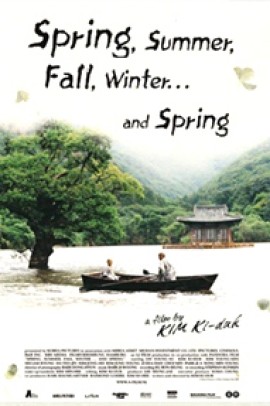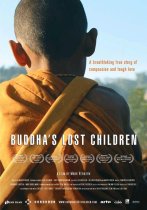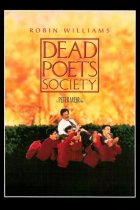Spring, Summer, Fall, Winter… and Spring (2003)
Synopsis
This movie about two Buddhist monks, a master and a novice, living in a temple floating on a lake in Korea is a journey into the deep stillness that is the ever-present undercurrent of our lives. It is a meditation on existence, life and death, and the cycle that connects them. It is disarmingly beautiful in its simplicity. Yet it is extremely profound. Lower your shoulders. Breathe deeply. It is time to discover the path that leads within.

| Genre | Drama |
| Production year | 2003 |
| Director | Ki-duk Kim |
| Male actors | Yeong-su Oh, Ki-duk Kim |
Reclaiming our balls in a temple in a valley in Korea
by Eivind Figenschau Skjellum
This review requires some insight into David Deida’s writing on stage 1-2-3.
Putting words to a film like this is almost sacrilegious. It is a work of rare beauty and silence is its language. Yet, there are aspects of this movie that will serve us well in the context of masculine evolution. And we find them best in “Fall”. But first, some context…
The seasons of our lives
The passing of the seasons in this film is a not so subtle metaphor to the cycles of life and death in nature and the universe. We’re born in Spring and die in Winter. In Spring, we’re completely at the mercy of our surroundings. We’re sensitive sponges that soak up everything that happens around us. Thus, we create an identity.
Then Summer comes, and we blossom. Hormones shoot through our bodies and we discover the opposite sex. We rebel against the people and circumstances that were the cornerstones of Spring. Then aging and suffering have Fall sneak up on us. We mature and for the first time consider our own mortality. It is in Fall that wisdom arises. If you have seen Into the Wild, you can see how Chris has the Fall of his life start as he reaches Alaska. He’s young to discover Fall; an evolutionary revolutionary.
The novice monk leaves his master in “Summer” to chase a girl who comes to be healed from her ailments in the temple. Many years later, in “Fall”, he returns – as a murderer. “Have you had a nice life since we last saw each other?”, the master asks, already knowing he has killed his wife. “The world of Men has become troubling, has it not?”. The pain of existence is etched into the returned novice’s face.
The masculine’s role in exorcising our demons
The younger monk, in his total despair, makes a half-assed attempt to kill himself. The master, who has been a gentle man so far, attacks the young monk with fierceness in his eyes and firmness in his swings. This scene is important. It’s so so SO incredibly important! The severe beating the master gives his student is an act of love. It’s not violence, it is L-O-V-E. Masculine love at its finest.
The novice is falling apart at the seams from the evils he has visited upon the world. He desires punishment so bad that he wants to kill himself; wipe the evil that is his sordid little self off the face of the earth! The demons that torment him cannot be banished by his own blood-stained hands. So his Master takes it on himself to beat him to a pulp.
The beauty of this scene, and the unexpected love present in the Master’s ass-whopping, act as a contrast to a great misfortune that have befallen us in society as we have made good-intentioned attempts at driving violence and aggression out of men. To a large extent, we have succeeded. Men are, I think, overall less violent than they used to be. But we threw our testicles out with the bathwater. We have become so focused on, so sensitive to, the downsides of masculine aggression and intensity, that we have failed to see that in eradicating these qualities in men, we have eradicated masculine love as well.
Masculine love is by definition penetrating. It’s confrontational. It’s not necessarily peaceful. If it must, it will go to battle with a sword in its hand, and an open warrior heart. But there are so many screwed up masculine people in the world, operating from DD1, that we have become blind to the fact that there is DD3 as well. (Read about David Deida’s three stages if you haven’t before reading further from this part. This information is soon to be featured on this site.)
And by wrapping the violence and intensity of DD1 in thick layers of shame, men become trapped in DD2. And this is where it becomes so damned interesting and the vastness of our mistake reveals itself. When we take “bad men”, violent DD1 men, and shove them through a DD2 judicial system, from police to court to jail, there is not likely to be a single man on the side of law & order in that entire process that takes responsibility for the DD1 man, who feels with compassion, wisdom and piercing clarity into his heart, and punishes him out of love.
The unfortunate side-effects of postmodern niceness
In a DD2 society, a postmodern society, the worst DD1 men are free to cause havoc, because the demons that torment them generally just won’t leave them, no matter how many years they spend in prison. You can only beat demons out of someone with love, as shown so beautifully by the scene we just looked at.
And when entire DD1-centric cultures arrive through immigration in DD2-centric societies, they will not want to adapt and integrate. They will look down on the pussywhipped men of DD2, and not until the DD2 culture starts evolving into DD3 will these DD1 men and women open up to growth. This view is coarse and painting with broad strokes. But I think you’ll find it’s accurate.
This, if accurate, has pretty big implications. It could very well mean that unless we develop into DD3 as soon as possible, or 2nd tier in the Spiral Dynamics model, we could be screwed by all the demons that we didn’t dare beat out of people from the standpoint of our puny DD2 selves. I’m not campaigning for wanton violence with these statements. But I am campaigning for re-embracing the anger inherent in masculine love as a necessary step in healing the many fractured souls out there. Souls that are not capable of seeing that their ways are evil.
Purification on the other side of purgatory
For the novice monk, the mature masculine expression of loving punishment becomes his salvation. He goes to prison, and comes back in “Winter”, purged of his demons from the time behind bars, instructed as he was by his Master to accept the punishment that was coming to him. His Master is now dead, having shown transcendence over life by giving his own life as a sacrifice on a funeral pyre, as the karma of his life had been fulfilled. Sidenote: The pearls the returning monk picks out of the ice are relics that appear from the bodies of spiritually realized meditation practitioners.
In a beautiful and climactic scene, the now free monk ties a rope with a heavy grindstone around his waist, and goes into the cold winter woods carrying what I believe is a Kuan Yin statue, the Buddhist embodiment of compassion. This scene is loaded with meaning. There’s the sense that he’s not only carrying the sins of his own past with him. He’s carrying the sins of all humanity. And he takes those sins, and offers their purification as a gift to the world through the blessings of Kuan Yin.
We cannot change our past. And it bears little fruit dwelling on it. But we can surrender to the world, as it beats the demons out of us (be it through depression, chronic illness etc), and then offer that purification as a gift in service of humanity. Who knows if it makes a difference to the world. But it certainly has made a difference to me. Truth be told though, they are high goals – and I can do little but kneel at their feet. While keeping my heart open as another swing from the master of Life approaches.
Accepting our destiny
The beating goes on. And we can do little but inhale, center ourselves, and surrender in love to what is coming; trying to escape pain is the beginning of our weakness. And then, if we have it in us, we exhale into the world with an open heart, pressing through all pain and misery and obstructions and become a living sacrifice. Remember General Maximus. Remember Christopher. Many of the stories we love are like this. So maybe, to love our life, ours must be too?
Perhaps, though, we’ll postpone the dying part for another day.





